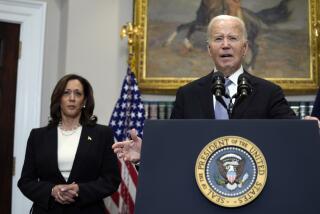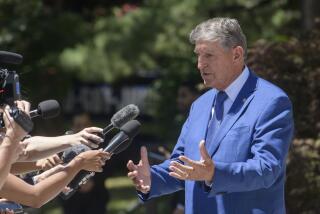Frist announces he won’t run for president in 2008
WASHINGTON — Sen. Bill Frist of Tennessee announced Wednesday that he would not run for president in 2008, a decision that may boost support for other Republicans who have courted the party’s social conservatives.
Frist had advanced the key bloc’s agenda during the four years he was Senate majority leader. With his withdrawal, several potential GOP candidates will have less competition wooing those voters.
They include Massachusetts Gov. Mitt Romney, Sen. Sam Brownback of Kansas, Arkansas Gov. Mike Huckabee and former House Speaker Newt Gingrich of Georgia.
At this early stage in the campaign, polls show Sen. John McCain of Arizona and former New York Mayor Rudolph W. Giuliani leading the pack for the Republican nomination. But Giuliani has a liberal record on issues such as abortion and gay rights. And many social conservatives are skeptical of McCain’s commitment to their causes.
As a result, some are pushing the movement to coalesce behind another candidate.
Frist, who did not seek a third Senate term this year, had only mixed success in attracting social conservatives to his side.
Tom McClusky, vice president for government affairs of the Family Research Council, praised him for helping confirm two of President Bush’s Supreme Court nominees, John G. Roberts Jr. and Samuel A. Alito Jr.
Frist also was instrumental in securing tougher penalties for violating broadcast decency laws and in prolonging the life of Terri Schiavo, a brain-damaged Florida woman who died last year after a court ordered that she be removed from life support systems.
“But it is doubtful that we would have supported him,” McClusky said. The reason: Frist’s support for embryonic stem cell research.
Frist, 54, long had been viewed as a likely 2008 presidential contender. But his fortunes faded as criticism mounted that he was ineffective in his Senate leadership post.
His role in the Schiavo controversy also appeared to hurt his standing, with polls showing that many voters questioned the government’s intervention in the case. He was assailed for publicly questioning the diagnosis that Schiavo was in a vegetative state after he viewed a videotape of the woman.
Despite such setbacks, it was assumed in most political circles that he would focus on building a presidential campaign upon leaving the Senate.
Instead, in a statement released Wednesday, he said, “God tells us for everything there is a season, and for me, for now, this season of being an elected official has come to a close.”
A renowned surgeon before he became a politician, Frist said he needed “a sabbatical from public life.”
Those close to him said they expected him to return to the practice of medicine in some capacity.
“This is a heart surgeon, and he wants to go back and reenergize those parts of him,” said David Winston, a Republican strategist who worked frequently with Frist.
Winston added, “Even as Senate majority leader, he would do heart operations on gorillas at the zoo.”
Frist’s associates also said his decision not to run for president had nothing to do with a Securities and Exchange Commission investigation of insider trading charges in connection with his sale of shares in HCA Inc., the hospital chain that his father helped found.
Frist has denied any wrongdoing in the matter, which has been under federal scrutiny for more than a year.
His decision came less than two months after former Virginia Gov. Mark Warner, a Democrat, surprised many in his party by announcing that he would not run for president. Warner said he was unwilling to make the family sacrifices demanded by a White House campaign.
The GOP race already had been reshaped by this year’s midterm campaign. Six months ago, Sen. George Allen of Virginia was seen as a potential strong contender. But he stumbled as he sought reelection to the Senate, losing the race and effectively ending his presidential chances.
*
More to Read
Get the L.A. Times Politics newsletter
Deeply reported insights into legislation, politics and policy from Sacramento, Washington and beyond. In your inbox three times per week.
You may occasionally receive promotional content from the Los Angeles Times.










